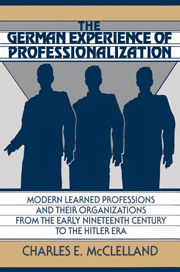 The German Experience of Professionalization
The German Experience of Professionalization Book contents
- Frontmatter
- Contents
- Acknowledgments
- Abbreviations
- Part I The problem of professions in Germany
- Part II The transition to modern professions in the early nineteenth century
- Part III Unified professions in a unified Germany?
- 5 The organization of the “free” professions: medicine, law, engineering, and chemistry
- 6 Organization of state-service professions: teachers and the clergy
- 7 Professional credentials in the new Reich
- Part IV Breakthroughs and breakdowns: The professions enter the era of cartels and unions
- Part V The Weimar era
- Part VI The fate of professions under and after fascism
- A word about sources
- Index
6 - Organization of state-service professions: teachers and the clergy
Published online by Cambridge University Press: 06 July 2010
- Frontmatter
- Contents
- Acknowledgments
- Abbreviations
- Part I The problem of professions in Germany
- Part II The transition to modern professions in the early nineteenth century
- Part III Unified professions in a unified Germany?
- 5 The organization of the “free” professions: medicine, law, engineering, and chemistry
- 6 Organization of state-service professions: teachers and the clergy
- 7 Professional credentials in the new Reich
- Part IV Breakthroughs and breakdowns: The professions enter the era of cartels and unions
- Part V The Weimar era
- Part VI The fate of professions under and after fascism
- A word about sources
- Index
Summary
TEACHERS: THE FIRST ORGANIZED BUREAUCRATIC PROFESSION
“The Prussian schoolteacher won the battle of Sadowa,” as a widely quoted phrase went in 1866; later the French government shared a similar view regarding Sedan. As the highly centralized French education system underwent reforms in the 1870s prompted by France's defeat by Prussia, new winds also began to blow in the school corridors of Germany.
Perhaps the most significant immediate result of German unification for the school lay not in structural reform, however, but in the Kulturkampf that weakened the traditionally close cooperation between church and state in educational affairs. The “battle for modern civilization” (as the Prussian professor Rudolf Virchow dubbed it) was especially acute in Prussia, which constituted roughly two-thirds of the new German Reich. The various measures passed by the Reichstag and the Prussian Diet under Adalbert Falk as Kultusminister (Minister of Cults and Education) in the 1870s rallied many of the German teachers who, since Diesterweg and the 1848 Revolution, had favored secularizing schools.
In this atmosphere, attempts to found vigorous professional associations of teachers appeared to make sense again after decades of overt government hostility. German schoolteachers took advantage of the new liberal spirit in the Reich to found the Deutscher Lehrerverein (German Teachers Association, or DLV) in 1872.
As will be seen below, the DLV generated at first only a modest attraction for schoolteachers. First, in the spirit of the 1848 radicals who had founded the Allgemeiner Deutscher Lehrerverein, the leaders of the DLV tended to favor reforms that would secularize and democratize the school system.
- Type
- Chapter
- Information
- The German Experience of ProfessionalizationModern Learned Professions and their Organizations from the Early Nineteenth Century to the Hitler Era, pp. 98 - 106Publisher: Cambridge University PressPrint publication year: 1991


